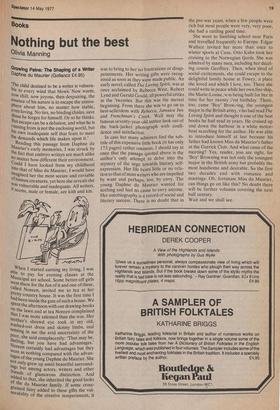Books
Nothing but the best
Olivia manning 2r0wing Pains: The Shaping of a Writer Daphne du Maurier (Gollancz £4.95) 'The child destined to be a writer is vulnerable to every wind that blows. Now warm, ROW chill, now joyous, then despairing, the essence of his nature is to escape the atmosPhere about him, no matter how stable, even loving. No ties, no binding chains, save those he forges for himself. Or so he thinks. But escape can be a delusion, and what he is running from is not the enclosing world, but hIS own inadequate self that fears to meet the demands which life makes upon it.' Reading this passage from Daphne du Maurier's early memories, I was struck by the fact that embryo writers are much alike no matter how different their environment. Could I have looked from my childhood into that of Miss du Maurier, I would have intagined her the most secure and enviable of human creatures, yet here she reveals she !'bras vulnerable and inadequate. All writers, It seems, male or female, are kith and kin.
When I started earning my living, I was able to pay for evening classes at the Municipal art school. Some better-off girls went there for the fun of it and one of these, called Noreen, invited me to tea at her Pretty country house. It was the first time I had been inside the gate of such a house. We Spent the afternoon with our drawing-books O n the lawn and at tea Noreen complained that I was more talented than she was. Her Mother's shrewd eye took in my old, Washed-out dress and skinny limbs, and sensing in me the avid uncertainty of the Poor, she said complacently: 'That may be, darling, but you have had advantages.' Noreen certainly had advantages but they were as nothing compared with the advantages of the young Daphne du Maurier. She tlt only grew up amid beautiful surround!rigs but amqng actors, writers and other friends of glamorous distinction. And added to that, she inherited the good looks of the du Maurier family. If some crossgrained fairy added to these gifts the vulnerability of the creative temperament, It was to bring to her no frustrations or disappointments. Her writing gifts were recognised as soon as they were made public. An early novel, called The Loving Spirit, was at once acclaimed by Rebecca West, Robert Lynd and Gerald Gould, all powerful critics in the 'twenties. But this was the merest beginning. From there she was to go on to best-sellerdom with Rebecca, Jamaica Inn and Frenchman's Creek. Well may the famous seventy-year-old author look out of the back-jacket photograph with confidence and satisfaction.
In case her many admirers find the subtitle of this expensive little book (it has only 173 pages) rather ominous, I should say at once that the passage quoted above is the author's only attempt to delve into the mystery of the urge towards literary selfexpression. Her life bears little or no relation to that of most writers who are impelled by want and perhaps, too, by envy. The young Daphne du Maurier wanted for nothing and had no cause to envy anyone. Her autobiography is a record of social and literary success. There is no doubt that in
the pre-war years, when a few people were rich but most people were very, very poor, she had a rattling good time.
She went to finishing school near Paris and travelled frequently to Europe. Edgar Wallace invited her more than once to winter sports at Caux. Otto Kahn took her cruising to the Norwegian fjords. She was admired by many men, including her dazzling cousin Geoffrey. Then, when tired of social excitements, she could escape to the delightful family house at Fowey, a place she loved and which I love, too. There she could write in peace while her own fine ship, the Marie-Louise, w as being built for her in time for her twenty i'rst birthday. There, too, came 'Boy' Browoing, the youngest major in the British army, who had read The Loving Spirit and thought it one of the best books he had read in years. He cruised up and down the harbour in a white motorboat searching for the author. He was able to introduce himself at last because his father had known Miss du Maurier's father at the Garrick Club. And what came of the meeting? Yes, reader, you are right, for 'Boy' Browning was not only the youngest major in the British army but probably the most handsome and desirable. So the first two decades end with romance and marriage. Oh, fortunate Miss du Maurier, can things go on like this? No doubt there will be further volumes covering the next half century.
Wait and we shall see.


































 Previous page
Previous page